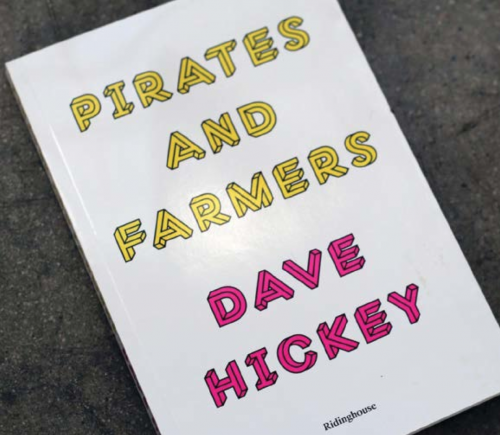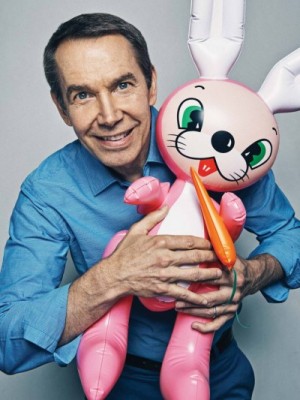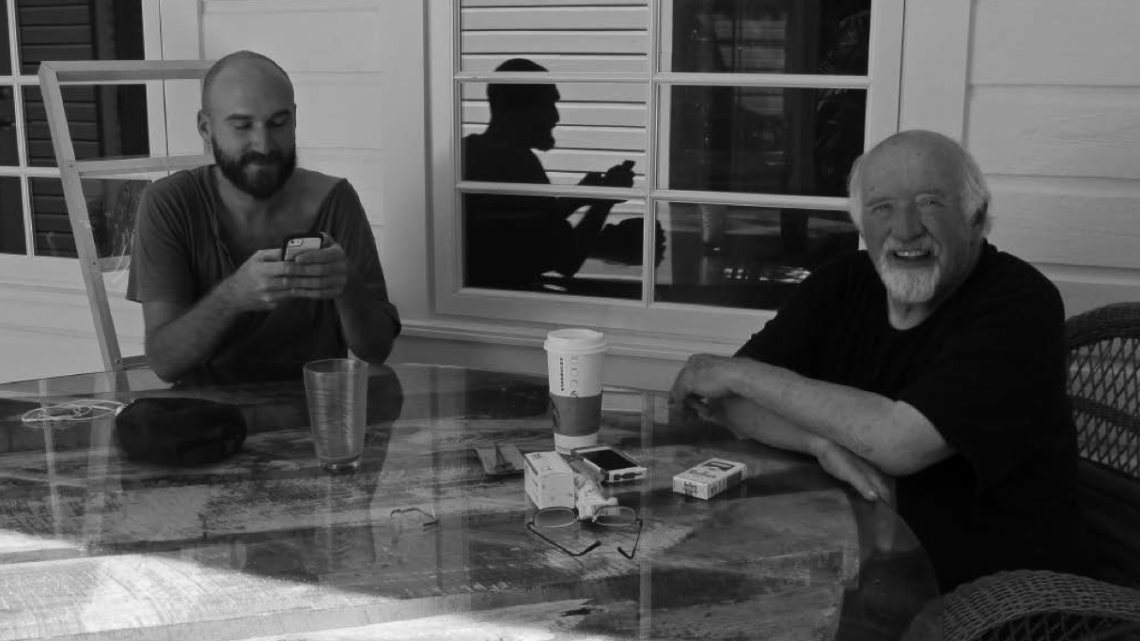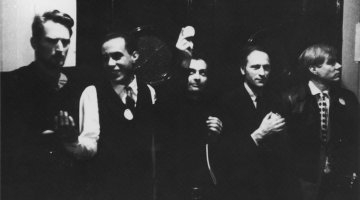‘I was stuck on a remote island for five weeks with Dave Hickey—’ I started telling my friend when I got back in New York. Her face was dismayed, ‘—and it was paradise,’ I went on. My friend’s disapproval slowly melted as I spoke, until she finally confessed, ‘I picked up his recent book and liked it, but someone saw it and told me, ‘Don’t read that! I know it seems exciting, but he is a misogynist cowboy,’ and I never finished it.’ This is not an uncommon response to the mention of Dave Hickey, an iconoclastic writer eliciting ire and adoration for his belles lettres prose and his crusade against art world iniquity. When I realized we’d be together in residence at the Robert Rauschenberg Foundation my mind flashed to his recent talk in LA where he reportedly said, ‘Identity politics broke the art world.’ As a flamboyant gay man intending to spend the entire residency in the shortest possible shorts, and as a writer largely interested in art by people who are not straight white guys, I worried we might not get along. What I found was, like all brilliant and truly worthwhile people, Dave Hickey is complicated and I liked him immensely. Authentic, fun and deeply sensitive—he is all you could want in another person in the world. I ordered his books while I was there and I was struck by how beautifully he fits the precision of his language with the originality of his ideas. During our last week in Captiva we met for three mornings on his sunny porch to record this conversation. The most important missing elements from this transcription are the skinks, the thick sunshine, and the laughter that punctuated our conversations.
MORNING ONE: A Pirate Retirement
In Pirates and Farmers (2013) you describe the personality type of the pirate concluding, “The paradox of a pirate retirement. You can’t do it.”
So I lied, and have before. I have a history of quitting things I have not found worthy. Sometimes I’m wrong, but I am still here to write about art that doesn’t come with an excuse or a letter from a doctor.
What was the purpose of proclaiming a retirement, knowing full well it’s impossible for a pirate like you? What are you doing now that is different?
What I’m not doing now is interacting with the art world. Every six weeks or so I fly to New York, I stay at the Warwick or somewhere Midtown, get a limo, and go look at art—the art promises not to say I’ve been looking at it—then I go home. I’m an art person; I’m not an “art world person” anymore.

Dave Hickey, Pirates and Farmers: Essays on Taste, Ram Publications (Los Angeles), 2013.
You allude in several places to the work in literature you were doing as a Ph.D. student at the University of Texas; I want to know a little more about what you were working on.
I was figuring out what I would call a grammatical calculus for describing language in a musical sense, incorporating elements of speed and frequency, so that you’re not just counting the repetitions of the word but you’re counting how often and how fast words repeat so you can get a much clearer sense of the prose you’re describing. It’s more like musical notation software. I had a passage from Hemingway, D.H. Lawrence, and Gertrude Stein each in three states of revision. Because I was at UT, they had all the manuscripts. I thought I could encode all these and, since revisions are presumed to be intentional, I could make empirical statements about intention by encoding the changes from version to version. Nobody makes empirical statements about intention, but I thought that it could be done, and I think I pretty much did it, although I ran up against a lot of problems with my committee. Most offensively, I took exception to a part of Chomsky that he couldn’t live without but I could—I’ll give you an example: “I” and “you”—personal pronouns? They’re not “pronouns.” They don’t stand for nouns; they stand for gestures, they stand at the portal between the palpable world and the world of language, and that changes the way sentences are generated. It also creates a kind of tiered system so that sentences that use “I” are first level sentences, “you” or “it” are in different categories altogether. Shifting into and out of these modes, especially with D.H. Lawrence, seemed to be a good way of demonstrating that, but I couldn’t do it without dissing Chomsky—and I did severely want to diss Chomsky. They—never let me defend my dissertation, but I wrote it; I learned a whole lot; and I was right.
You reference J. L. Austin. Is that where your thinking about language then goes? Toward his performative speech acts?
I treat literary prose as performative speech, and I’m interested in what they call the “phonotext”—you hear it as you read it. If you can’t hear the phonotext, you don’t know what prose is. Many academics don’t deal with the phonotext at all, they just read the words. I’m doing a talk at the College Art Association in February called “Theory and Critique: The Raw and the Cooked” and I come out in favor of the raw theory—no footnotes, so it’s lodged into the world, not lodged into other texts through footnotes.
Your analysis of the phonotext comes out of a lifelong love of music.
Yes, and I listen well.
What was the music that preceded your studies, when you were a child?
My dad was a bebop musician and I was a rock and roll person and I could read music, although I can’t write it out very well. I just tend to think of things in musical terms. This puts me in a tradition with Monet, Miro, and Braque—people who were basically musical painters. Duchamp was the alternative and nobody got further on a one-trick pony than he did—a phonotext critique leads you into the tangible world, and for some reason Duchampian critique leads you back into theory. Also, I always thought it was my job to make up jargon and not to use it. I was a serious structuralist in graduate school in the 1960s—I wrote art criticism for nearly twenty years without using “desire,” “deconstruction,” or any of those words. Finally I was forced into using them because people presumed that you had to use those words or you weren’t “serious.” I remember the first thing I did that used those words was a piece on Jim Shaw. It talked about “representation” and “jouissance”—which are a fairly shoddy concepts.
What do you mean?
Is there anything that is not representation? Like “self-expression”—is there any art that is not self-expression? Also, where do you locate the boundary between jouissance and what is not?
After the work you did on literature in Texas, when you went to New York to work at Reese Palley gallery, you started writing about art. How did you approach writing then? Is there a connection between the kind of scholarly analysis you were doing on literature and the process of looking at art and writing about looking?
I was learning how to write by studying linguistics, like a painter learning her palate. There may be a connection since my mother was a painter, but the sequence was interesting. I was doing literature and then I discovered that Ruscha, Rauschenberg, and Johns loved language the way I loved it. I was beguiled by the idea of Ruscha using the incarnate word, which is not the referential word but the word as flesh, and that seemed pretty much to define a particular point of view, which Mapplethorpe and a lot of canonical Catholic artists used. This interested me more than Saul Bellow ever did—I want the language but I don’t want this shit. I threw my copy of The Adventures of Augie March (1953) into the Atlantic—how symbolic.
We talked earlier about that part of Auden where he says that all critics should have to define their Eden. That seems like what you’ve been doing, and your Eden is like Las Vegas.
It’s like Vegas but with good waves. It has Ellsworth Kellys and French food. I think Eden is a good subject because the idea of utopia is a dead turd, some group invention. Seeking the architecture of Eden is my own little search for the sources of the Nile, so I never really feel competitive with anyone. Peter Schjeldahl can write pretty things and I say “that’s pretty.” Peter Plagens and any number of my contemporaries can write nice things—Paul Taylor could, even Craig Owens when he wasn’t in the grip of his professors. The way that I write never became anything in the art world but “the way Dave writes.”
I feel one of the problems in the art world now is the people writing about art and putting on shows are not reading novels or poems, and that’s a big impoverishment of experience.
No shit! They don’t know what a Beethoven quartet is either. Four movies about a St. Bernard, perhaps? I teach a course called “The Sisterhood of the Arts” and it’s about the points where art, music, and drama intersect. That sisterhood—that primal interconnection—that dance of frequencies—is being changed into a primal connection to academic prose, and that is cultural suicide.
After you worked in the New York art world for a period in the ‘70s, you left to be part of the music scene. What precipitated that?
Boredom. I got tired of invitations I couldn’t refuse. I got fired from my gallery job. I got fired from Art in America. I started freelancing about music. I describe the moment like this—it was ‘72 or ‘73—I’m walking out of a Richard Tuttle show where he has glued weird white pieces of paper to the wall. I’m thinking “Richard Tuttle or Keith Richards? Richard Tuttle or Keith Richards?” It was as simple as that—it was more fun to write about Keith Richards. The drugs were better for sure. Also I was really interested in that kind of fame, not in the sense of wanting it, but just in knowing what the mechanics of fame might be.
When I was still running the gallery in SoHo, I was sitting in Max’s. Two people in another booth were talking about me. According to them it turns out I have a trust fund, I’m bisexual, and have an eidetic memory. The last is true but they were describing—there was a whole description of a person who was not me and I was thinking: Jesus, what would it be like to be Rick Derringer or someone like that. So for me the music writing was really focused on the vagaries of fame—what is it like to have another you out there in the world, doing shit, siring children . . . Eric Clapton told me this story: Cream was playing in the Midwest one night, jamming away; Clapton dropped his pick and bent over to pick it up. The crowd went wild—the whole time the crowd is cheering. They were cheering for him dropping his pick. He said, “I felt like walking off stage and killing myself. What the fuck am I doing here?”

Damien Hirst. Courtesy of the Internet.
Doesn’t this relate to what was going on with Warhol in New York—this very question of celebrity—but in a more contained sphere?
I thought about that a lot with Andy because he was the fame guy. Finally, I think Andy really believed that there was true fame, or true charisma, and that Marilyn or a number of people had this true charisma. Otherwise Andy was an ad guy. He knew you could make people think anything. So the star-making process of the factory was this enormous bullshit mind-fuck of “I can make you do that.” Warhol was a control freak. He went off the rails in the mid ‘60s when he discovered that he could make people do things. He could say “could you take off your pants, fella?” and the fella would take off his pants and show Andy his dick. For Warhol, who wouldn’t do anything you told him, this must have been a traumatic disappointment. I think he was angry that all he had built was a bunch a people who would do whatever he told them to. I’ve always regarded fame the way Andy did; I know people who have authentic charisma—Rod Stewart has authentic charisma. If you’re in the room with him, he’s in Technicolor and you’re in black and white. I’ve known a few people like that, but fame is mostly copy and coverage. A lot of the people I know who are famous are like Emmylou Harris, who is an old friend of mine. Emmylou is comfortable one place: on the stage with a guitar behind the microphone. If she’s not there, she’s not comfortable. I’m sure there is some psychological name for that.
When you started to become involved with people who were “real” celebrities in the music world, what did it show you about art?
The first thing I learned is that there is no qualitative difference between great pop and great art. Good is good. Second thing I learned was that if you’re going to be in rock and roll, bring a friend, because it can all turn to shit fast. I’ve known the guys from The Eagles over the years and just in passing, and they were really good buddies and that blew up so hysterically. I never would think of writing about an artist the way I wrote about Keith Richards, because the object is there today and there will be another every day—there will be a new day when they’re dead—so that is a liberation.
Do you listen to music when you write?
No. I used to, but I don’t anymore. I hear the words too much.
There seems like an interesting connection to you being a songwriter and traveling with country music people and the way that you dealt with the more recent phase of your life as a critic, which is as a persona an “outlaw,” an oppositional voice.
Well, I named those Nashville guys “The Outlaws” in a magazine article. As for me, I’m a hard core alienated person, although a sweetie pie. I went to grammar school for four years at thirteen grammar schools, and if you do this, you get good at goodbye. I’m happy to see people that I haven’t seen in fifteen years, that’s ok. We don’t exchange Christmas cards, that’s ok. I’m always sad when they die, and that is one good thing about digital: the hardest thing to do is to take dead people out of your Rolodex. I remember taking Scott Burton out of my Rolodex and thinking “awe, boohoo, Scott!” At the same time, this ties in with my feelings about fame: if you would tell me who I’m supposed to be famous to or for, I could address myself to it, but I’m not really close enough to anybody or any institution to know. Art critics are not supposed to be famous. I have had periods of 40-watt celebrity and they weren’t any better than any other time. If you’re in a band, you’ve still got to get up and play. If you’re a writer, you have to get up and write, win or lose. If you win, you’re in vogue. I know what works: word of mouth and that is all it is—there isn’t anything anybody at Columbia might write that is going to make you famous.
I’m interested in this because of the Koons effect: what is this thing that metastasized from Andy Warhol into this pedantic, funless, critically unassailable thing embodied by Koons?
I just finished a book I really like called The Eloquence of Color (1993) by Jacqueline Lichtenstein about the 17th-century French academy which was divided between those who believed in line and those who believed in color. The linear people were pedants, and I think Jeff is a pedant. As they would say in the 17th century, “He stinks of the ink pot.” He has a terrible penchant for these retro-Fitzcarraldo technological projects that don’t do anything. How could Jeff Koons and Robert Gober do the same thing—which is manufacture found objects? Jeff to no end and Robert to what seems like profound ends? I don’t understand. I used to work at Reese Palley right across the street from Fanelli’s, which is where Jeff always was. From the first, I was amazed by the thud of his wit—it was not there. People say “Jeff is so childlike” and I think he is really like a child, and I don’t attach any joke or flattery to that remark. You’re always asked by people who collect, “What am I paying for?” “Am I paying for Rauschenberg’s elan?” With Jeff it’s clear you’re paying for a whole lot of Detroit technology and that is an investment. And Damien Hirst is the same. They both make work that looks like work.
I have a hard time with the fluffy art world. A lot of my opinions have changed over the years and a lot of my contemporaries are not making as good art as they used to. They still do good art but—

Jeff Koons. Courtesy of the Internet.
Is that because of the climate in which they are making art, or what?
A lot of it is the production demand. To cite a really good Ruscha drawing: “She Sure Knew Her Devotionals.” What is that about? It’s three graphic locutions of the shush phoneme: SH / SU / TION. That is all it is. It’s cool but not a lot of people know that or care. Is Ed going to go back and do that for two million dollars? Or “Guacamole Airlines,” which comes out as “Wacky Molière Lines,” acknowledging Edward’s French descendants. But no longer. Ed is pretty interesting as an artist—serious in his own way, cagey beyond imagining.
You’re working on an autobiographical book. In Pirates and Farmers you said, “My life doesn’t have a narrative, it has episodes.” What is the importance in that distinction?
I’ve always used autobiographical stuff as a pendant in criticism—I dangle it out there. Using criticism as a pendant to personal narrative is going to be a little harder. I have fallen upon Tristram Shandy (1759-67) in the sense that my book will begin something like: “I knew I was coming out wrong. I was going to fall out of my mother’s pussy onto my ass with a cord around my neck. My mom was going to be rushed off to the ICU, and I knew she would hate me forever”—you know, something intimate like that. I’ll follow the general tonality of Tristram Shandy, of letting it change with my whims.
You put an epigraph from Tristram Shandy at the front of Invisible Dragon: Four Essays on Beauty (1993). It seems emblematic of the way you write.
It is, and would that I could write that well. This is one of the reasons my work doesn’t have much footing in the art world. Who’s read Tristram Shandy? My writing comes out of Victorian journalism—Ruskin and Carlyle, Charles Lamb and De Quincey. I was so glad when I found them. I picked up De Quincey’s Confessions of an English Opium-Eater (1821) for reasons other than prose. I was a fan of opium, but reading it I thought, “I can do this! I can write this kind of sentence that goes on for three pages and ends with one word, just like bam! I can do that!” Then I knew what to do, but it’s not a very fashionable way to write.
Given that so much of your own writing is grounded in “Dave Hickey”—your anecdotes and personal experiences—what do you think is useful to talk about: an artist’s life or what they have to say in relation to the art object? Or about yourself as the writer?
I’ve never regarded myself as much beyond an example of something, and I’ve always known that nobody is going to read this because it’s about art. They are going to read it because it’s good. That puts me and the genre at cross-purposes. I know most of the art criticism out there, and I have no idea why anybody would read that shit.

Michel Foucault. Courtesy of the Internet.
I think a lot of people are saying that too, and in fact no one is reading it. I almost suspect that there are political forces that do not want any form of real criticism.
I think what has happened is that critique won over theory. Theory died in 1978 or something like that. The whole “kill them all and stand on their tummies” attitude that Deleuze brought to the discourse is what I like about theory. The big problem was that Deleuze and Foucault in particular were translated by Americans who were liberals, and I don’t think that either one of them was. They are really too cold hearted to be liberals. I still like The Order of Things (1966) where Foucault dismantles sociology as a historical solipsism, but that was a war that Foucault lost. Look at The Logic of Sense (1969). It is about the phonotext, and Deleuze lost that one too.
You cultivate this brash cowboy persona but you’re actually a sweetheart and you really care; why not just be a little sweeter publicly?
Oh I’m a sensitive plant. The world is ablaze to me, and people are kaleidoscopes. I get my feelings hurt, so whatever brashness manifests itself in my manner is to cover that up. I wrote an essay in Air Guitar (1997) about going to a jam session with my dad—we went to play jazz. I still don’t know what to do about it. The essay made people cry. I wasn’t trying to do that, but maybe I’m such a swoony sop I can’t help it.
I re-read Invisible Dragon here. After having studied a lot about the culture wars and identity politics art in the 1990s it makes total sense as a culture war text.
It was intended to be. It was basically the same argument that Jacqueline Lichtenstein makes in The Eloquence of Color: there is a point in rhetoric where language stops and art goes on. Cicero said that his ideal orator need not say a word, but simply stand before the crowd to manifest the justice of his case. Out of this premise comes the elegant pantomime of Renaissance painting. That was my argument for beauty. With beauty you’re free. You don’t have to ask anybody. Why would you have to ask somebody?
You frequently turn to the founding of American democracy in your writing—
—I taught The Federalist Papers (1788) regularly for years.
I imagine you are the only art critic who does; when did that interest start?
It’s pretty much perpetual since civics in sixth grade, because it’s theory, because any country that chooses its masters then dispenses with them with a safe word is a masochistic country in love with threat and fear. More to the point I was talking to Ruscha about the way he works, his process. He said, “First I think up the idea, then I execute it, then I decide if it’s any good or not”—Executive, Legislative, Judicial! I know a hell of a lot of artists in this country who think like that. Also it’s really important because so many art propositions fall into ashes having failed the judicial. They lose becasue this is an adversarial culture; it is adversarial but not hierarchal. It’s “us against them” or “me versus you”—it’s about argument. I am not going to bring in some fucking ad guy like Charles Saatchi to tell me what’s good—shouldn’t I be arguing with him? I think we are affected because academia is hierarchal. The only real distinction I can make between the artists who teach and the artists who don’t is that artists who don’t teach will look you in the eye; the ones who do teach are either looking up to the dean or down to the students—they are comfy in that little place. Where did you go to school?
San Francisco Art Institute. Then I was at the CUNY Graduate Center, but I was a nightmare for everyone there and I dropped out.
Me too. Three times. I do not play well with others, and I do not know why. I like my friends but I hate to ask people for anything. I didn’t grow up asking people for things. The hierarchy in which the 1% have all the money is outrageous. The puppy food in the galleries that sells for a million dollars is 98% crap. Walter Robinson had that great line “zombie abstraction” and I can’t figure out a way into that work. I could be making five dollars a word if I could find a way into “the new casualism,” but there’s nothing there for me. Probably this is the consequence of minimalism. It did not change: it started and it ended and that was minimalism; the people who made minimalist art did the same piece over and over in different circumstances. My first art world job was to ration the tequila for Dan Flavin when he was installing in Fort Worth. It was funny because there were these three lighting technicians who were going to help Dan put up the piece. First two days, they thought Dan was crazy. Third day, one of these guys points up the ceiling and says “let’s put a yellow one right up there,” so you know it’s not rocket science.
I wrote a piece on Jasper once to which he actually sent me a note and said he liked it. The premise was “why would Jasper use numbers?” My answer is: because they are stupider than anything but letters, and he uses letters too. So all these stupid ideas are used to drive high interpretation away from John’s work, and open the way for something other, and that’s reasonable, at least to Jasper.
Have you ever written a review where the artist thought you got it totally wrong?
I wrote an essay about Susan Rothenberg that she tore up and hasn’t spoken to me since. I wrote an essay on Pistoletto. I had all these stacks of his diaries in Italian. My Italian is not good, but I read them. I wrote that essay and when I finished I thought, “I’m wrong and this is not good art. I really fucked up.” I improved my Italian, though.
Have your opinions on works of art changed over time?
Yeah, Pistoletto. I decided that Penone is the real artist in that crowd. There are people I still like, like Patrick Caulfield who ended up not particularly famous, which was good for Sarah Morris.
When you said Penone is a “real artist,” what is your definition of that?
Can’t not make it. That is my impression with Ruscha—he’s just always out there ferreting things out. I like real intellectual artists. I like Steve Prina and I like Josiah McElheny. I don’t want to say that art is a vocation for them but that’s probably what I mean—art is what they do. This is so diluted now. I would say that 90% of the artists showing in New York today are part-time adjuncts and sabbatical artists. The only way I can see this getting better is by people throwing in their cards and saying “I don’t want to play here anymore.” In the past, the great thing about New York was that you could always move to LA—The United States was at least a two-table casino, but they’ve converged.
It seems like something you hold as a virtue is the ability to bite the hand that feeds you.
That’s just business and reputation. You can rent my writing but you can’t buy my praise. Try it and I will fuck you up. Also, I was born with a passel of “I don’t care.”
Why do you think people keep inviting you to do stuff only to be shocked when you transgress?
I have no idea except I’m funny. Every time I get a chance to go to the Midwest it turns out they just wanted to get me up close to yell at me. I’ve had whole faculties walk out of lectures I’ve given in Iowa and Illinois. These are institutions of higher education. Big ceramics dudes are bumping me around like Brooklyn goombahs, feminist troglodytes shrieking that I’ve stolen their safety. It’s like a homeless row in Tompkins Park, so what do I do? Do I burst into tears and run sobbing into an empty classroom? Not an option. I just make snarky remarks about academic footwear. I’ve had students chanting “pig” in the first rows of a lecture at Claremont. I gave a lecture at Guelph—the newspaper the next morning said “Hickey offends Canada” without a thought to the damage inflicted by Justin Bieber and Celine Dion. I gave a lecture in LA and got 40 negative tweets in 40 minutes.
These experiences have hardened my heart. Standing up there you feel like Hannah Arendt after her book came out. I always wanted to be a bad man, but I have never been a “bad boy critic” even when I was a boy. I do not believe and I do not belong, and I’ve done evil deeds just because they are wrong, and I’m ok with that. The thing I loved the most about the art world, when I was running my gallery in Texas, was coming to New York so I could have lunch with Leo Castelli at La Pleiade, or go through the back rooms at Sidney Janis, or go see Lou Reed and Smithson at Max’s—I really looked forward to those moments. If I’m going to New York today, who am I going to see, Brooks and Lisa? That is why I don’t tell people when I come to town.



